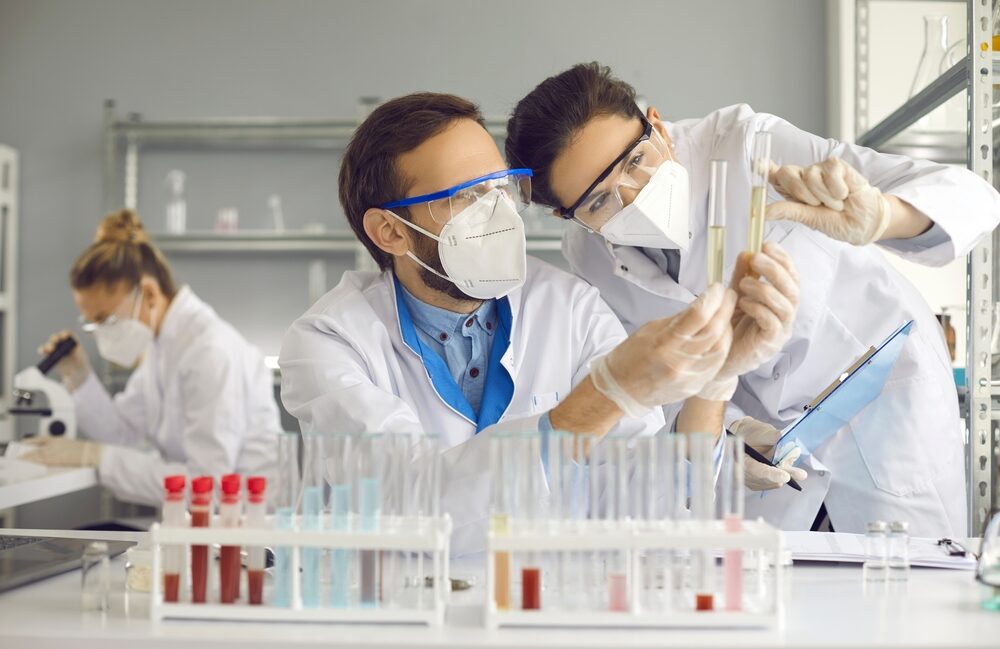
☝️ The most important facts in brief
- The standard period of study for the pharmacy degree programme is 8 semesters.
- Comprehensive knowledge from the fields of chemistry, biology, physics and medicine is taught during the degree programme.
- To work as a pharmacist, a one-year training programme is required after completing your studies.
- The job description for pharmacists is varied and includes working in pharmacies, quality assurance in the production of medicines and research.
📖 Table of contents
On the Pharmacy degree programme, students acquire the knowledge required for the development, production and analysis of medicinal products within the standard study period of 8 semesters. After passing the state examination, you can work in pharmacies, industry or research, among other things. However, additional qualifications are required for some areas.
The requirements for studying pharmacy at universities
To study pharmacy in Germany, you need the Abitur or the subject-specific higher education entrance qualification. As there are more applicants than places at universities, a correspondingly good A-level grade is required. In recent years, the required grade has been between 1.4 and 2.5, depending on the university.
You should also be interested in natural sciences such as biology, chemistry and physics and have mastered the basic knowledge in these areas taught at school, as these subjects are very important throughout your degree programme.
The study places for pharmacy are allocated centrally
Places on pharmacy degree programmes are allocated centrally via the Hochschulstart portal, which is responsible for admission-restricted degree programmes. Your A-level grades will determine whether you are given the opportunity to study pharmacy. You can apply online via Hochschulstart.
You can specify an order of your personal favourite universities. This has no influence on your general chance of being offered a place on the pharmacy degree programme and will not be communicated to the university in question. For example, if you have primarily applied for the degree programme at TU Braunschweig, but are then "only" offered a pharmacy degree programme in Kiel, the university will not be informed that you would have preferred other study options.
Study pharmacy abroad
For those who are unable to work in Germany due to the high NC for Pharmacy If you are unable to get a place on a pharmacy degree programme, studying abroad is an excellent alternative. The international orientation of the study programme and the cooperation with leading pharmaceutical companies also offer students valuable insights and experience. In addition, access to the degree programme is often less restrictive than in Germany, which enables motivated and qualified applicants to realise their dream of studying pharmacy. With a first-class education and international prospects, a university in another EU country offers ideal conditions for a successful career in pharmacy. So we at futuredoctor can also offer you a Study pharmacy without NC enable.
Procedure of the pharmacy degree programme: Contents and examinations
Regardless of the university, all pharmacy degree programmes are divided into two phases. After 4 semesters, half of the programme is completed and students take the first state examination. During this basic study programme, the following basic principles of pharmacy are taught in the following subjects, among others:
- Chemistry, Basics
- Pharmaceutical biology
- Physics
- Mathematical and statistical methods and analytical methods
- Fundamentals of anatomy, physiology and nutrition
- History of the natural sciences with regard to pharmacy
The second section focuses more on clinical pharmacy. Here you have to complete the following lectures and practical courses within the 4 semesters:
- Pharmaceutical/medical chemistry
- Pharmaceutical Biology
- Biochemistry and molecular biology
- Fundamentals of clinical chemistry and pathobiochemistry
- clinical pharmacy
- Biogenic drugs
- Microbiology
- Pharmaceutical Technology
- Quality assurance in the manufacture and testing of medicinal products
- Special areas of law for pharmacists
You will be admitted to the second state examination after submitting all proof of passing the examinations. You will then be able to work in many areas of pharmacy and pharmacology. As there are additional requirements in a pharmacy, one year of further training is required to work as a pharmacist.
Career prospects after completing a degree in pharmacy
After successfully completing your studies, you will be spoilt for choice as to which specialist area you would like to work in. For many students, working in a pharmacy is an attractive prospect. However, you should be aware that one year of additional training is required to obtain a licence to practise as a pharmacist.
In addition to pharmacies, numerous branches of the industry offer good opportunities for career starters who have completed a degree in pharmacy. As the quality of medicines and other pharmaceutical products is of great importance, quality assurance is one of the largest fields of employment here.
Another option is to get involved in research after studying pharmacy. Here, for example, you can contribute to the acquisition of new information on drugs and their effects or research the effect of the release of harmful substances in many areas.
Pharmacists are not only sought after by pharmaceutical companies. There are also many interesting jobs in chemistry, biology and technology as well as in medical pharmacology that are open to you after completing this degree programme.

Salary prospects for pharmacists
Pharmacists can look forward to an average starting salary of between 40,000 and 50,000 euros per year for a full-time position after completing their studies, regardless of the sector. This means that the earning potential is significantly better than in many other degree programmes.
The salary is even better if a doctorate is added. For this reason, many prospective pharmacists aim for a doctorate. This also opens up better career opportunities in industry and research.
Further qualifications are possible after the actual pharmacy degree programme
As already shown, a one-year training programme is required to be able to work as a pharmacist after studying pharmacy. A doctorate is another way of demonstrating that you are additionally qualified, as many institutes require pharmacists to have already carried out scientific work as a prerequisite for employment. Some prospective doctors begin their doctoral thesis while they are still studying pharmacy.
Depending on the job description of the position offered, it may be necessary to complete certain additional seminars in many areas of pharmacy. In some cases, these qualifications can also be obtained on a part-time basis.
How do the pharmacy degree programmes at the various universities differ?
As the degree programme in pharmacy ends with a state examination, the requirements are quite clear - unlike some degree programmes with a Master's or Bachelor's degree. Nevertheless, there are some differences between the universities in terms of the facilities and the specialisations set. This becomes clear, for example, at the TU Braunschweig, where there is a practice pharmacy equipped with the latest pharmacy software, which provides students with valuable knowledge about medicines and makes it easier for them to prepare for their future careers.
Braunschweig also has its own garden with medicinal plants. In addition to the plants commonly used today, there is a historical section of the garden in which the development of various medicinal products and their production from the past to the present can be traced very well.





